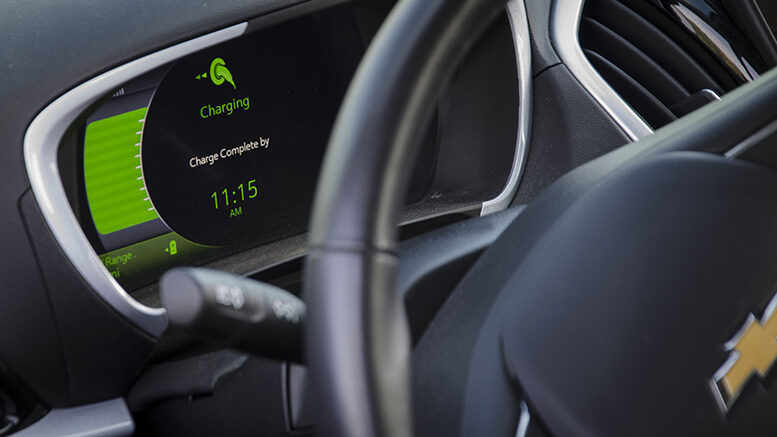By Tracy Warner—
- New partnership supports charger installations for customers
- $500 incentive for installation costs; lower rate available for overnight charging
- National Drive Electric Week helps highlight electric vehicle advantages
FORT WAYNE, Ind. – Indiana Michigan Power (I&M) has announced details of its IM Plugged In program that offers incentives to Indiana residential customers for installing charging equipment for electric vehicles. Participating customers also receive discounted rates for charging their electric vehicles overnight.
IM Plugged In makes charging electric vehicles more affordable and inviting to Hoosier customers as they choose their transportation options. IM Plugged In helps provide customers the convenience of being able to wake up every morning to a fully charged vehicle.
I&M is offering Hoosiers a $500 incentive toward the cost of wiring a residential electric vehicle meter. The rebate helps reduce the costs of installing a charger to take advantage of lower rates and is available to Indiana customers for new and existing equipment.
In a new partnership with I&M, HomeServe helps streamline the process by arranging for an electrical contractor to install the charging equipment and also offers a home wiring protection plan.
IM Plugged In also offers Indiana residential customers an overnight charging rate 33% below standard rates. The rate is available for Hoosiers who charge their vehicle between 11 p.m. and 6 a.m. Charging overnight at the lower off-peak rate creates savings that can equal up to driving 4,700 miles annually with zero fuel costs.
IM Plugged In has a separate program that helps business customers provide charging to their employees and for their fleet vehicles. The IM Plugged In commercial rebate is $250 for each charging port installed at qualified businesses. Incentives are also available for multi-unit apartment buildings.
More than 2 million plug-in electric vehicles are registered in the U.S., and according to the Edison Electric Institute, an estimated 18.7 million are expected to be on U.S. roads by 2030.
“Driving electric vehicles has never been more affordable for I&M’s Indiana customers who take advantage of our incentives and lower overnight rates for charging their electric vehicles,” said William Tokash, I&M’s Energy Services Customer Solutions leader. “Now, as more and more Hoosiers are purchasing electric vehicles, our new HomeServe partnership will help our Indiana customers with installing chargers and protecting their home wiring configurations.”
Kerri Garvin, Executive Director of Greater Indiana Clean Cities, Inc., adds that “Indiana Michigan Power’s electric vehicle programs are helping to remove barriers for Hoosiers interested in purchasing electric vehicles and installing charging equipment in their homes and businesses. The expansion of Indiana’s electric vehicle fleet will improve air quality, reduce greenhouse gas emissions and improve the health of all Hoosiers.”
Enjoy IM Plugged In Benefits
To participate, Hoosier residential customers need to install a charger and wiring that allows I&M to place a meter near the charging station to measure only electric vehicle charging. I&M’s $500 incentive payment for residential charging equipment helps offset the cost of the additional wiring for the meter. Importantly, customers are eligible for this rebate even if they already have an electric vehicle charger installed.
Details about the program and the many benefits of electric vehicles are available at www.IndianaMichiganPower.com/ElectricVehicles
Business customers can find more specific information about how IM Plugged In can help at the Web site and scrolling down to “Charge at Work in Indiana.” Customers with questions can email us at IMPluggedIn@aep.com with your contact information or call us at 260-408-3679.
Other Incentives
In addition to IM Plugged In, customers can look into other incentives. A 30% U.S. Federal Investment Tax Credit (EV ITC) may be applicable to the total cost of a residential or workplace/fleet businesses commercial electric vehicle charging station. The EV ITC covers the cost of electric vehicle charging equipment purchases and installation costs through December 31, 2021, The EV ITC is capped at $3,000 for residences and $30,000 for commercial workplace or fleet charging stations.
Additionally, battery electric and plug-in hybrid electric vehicles may be eligible for a federal income tax credit of up to $7,500. The credit amount will vary based on the vehicle make and model and the capacity of the battery used to power the vehicle. Check with the vehicle manufacturer and your tax advisor to confirm applicability.
Hoosiers Enjoy EV Benefits
With automakers offering more than 40 models of electric vehicles, Hoosiers are increasingly finding electric vehicles that suit their transportation needs and offer the convenience and comfort options they are accustomed to. For example, Indiana EV sales in 2020 rose 25% from 2019 to 2020.
Owners enjoy the environmental benefits of driving electric vehicles. Electric vehicles save time and money on reduced maintenance costs. For example, owners have no need to change engine oil or spark plugs and experience less brake wear.
Driving a battery-power electric vehicle costs about 60% less than a gasoline-fueled vehicle – and costs are even lower when customers use IM Plugged In’s off-peak rate.
Electric vehicles are important to the state of Indiana in other ways.
“Transportation and mobility are some of Indiana’s most important industries, especially given Indiana’s central location and the numerous interstate highways throughout our state,” said Garvin, of Greater Indiana. “It is vital that Indiana’s transportation infrastructure remain on the cutting edge of technology and consumers have a choice in the type of vehicle they choose to drive.”
About
Indiana Michigan Power (I&M) is headquartered in Fort Wayne, and its approximately 2,100 employees serve more than 600,000 customers. More than 85% of its energy delivered in 2020 was emission-free. I&M has at its availability various sources of generation including 2,278 MW of nuclear generation in Michigan, 450 MW of purchased wind generation from Indiana, more than 22 MW of hydro generation in both states and approximately 35 MW of large-scale solar generation in both states. The company’s generation portfolio also includes 2,620 MWof coal-fueled generation in Indiana.



